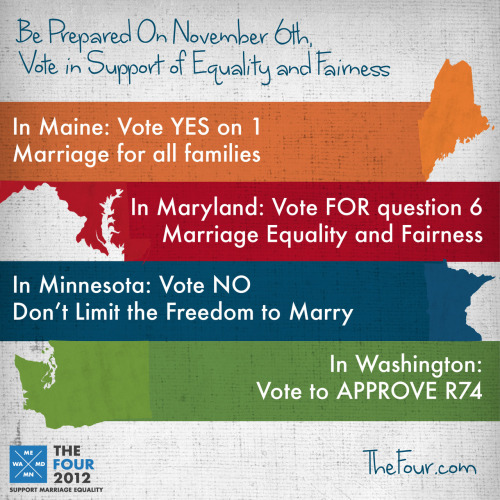I wonder if we will look back in a few years on 2012 as the inflection point, when the endgame began. I've often said that I'm tired of being "the gay blogger", "the gay scientist", or really, "the gay anything". My sexuality should be irrelevant as an adjective to my identity.
And perhaps that will happen, now that we have finally won. And not just won one squeaker of an election: no, we one four, solidly. Voters in 3 states (MD, ME, and WA) approved marriage equality. Two of these were referenda that approved previous legislative votes. In ME, it overturned the results of previous referendum. In MN, voters rejected an anti-equality marriage amendment to the state Constitution. Same Sex Marriage is already illegal in MN, but it's easier to repeal a law than an amendment.
Interestingly, in the past, there has been a substantial "Bradley Effect" in polls on marriage equality, where the support is over stated. This is thought to represent the unwillingness of people to admit to pollsters that they are biased against LGBT people. But the polls here were pretty accurate. I guess people are telling the truth, now, and the ones opposed aren't embarrassed by their opposition.
What's striking about the battle is that this was waged heavily by the Roman Catholic church. There were long letters from the Bishops, full of anti-gay hyperbole, and millions of dollars were funneled through the Knights of Columbus and the National Organization for (straight-only) Marriage, which really no longer pretends to be anything other than a Roman Catholic front group. But Catholics pushed back. In MN, and WA, groups of Catholics For Equality fought vigorously and not despite their faith, but because of it.
The Bishops also were fervant Obama opponents, but exit polls suggest our returning President won over 50% of the RC vote. Those of us who are religion-watchers will be eating the popcorn as we watch the see-saw between the out-of-touch Roman Catholic hierarchy and the Roman Catholics in the pews. But I digress.
In a few weeks, the Supreme Court will decide whether to hear cases on Prop8 or DOMA. The court-watchers think they will hear DOMA, but will punt the Prop8 case, which means that the Ninth Circuit decision will hold, and marriage equality will return to CA.
And when it does, California will join TEN other states and jurisdiction in the US where marriage is legal. TEN!
And the marriage bans in the other states will, in time, go the way of JimCrow, or anti-miscegenation laws.
And it finally will not matter that I am a lesbian American, just an American.













